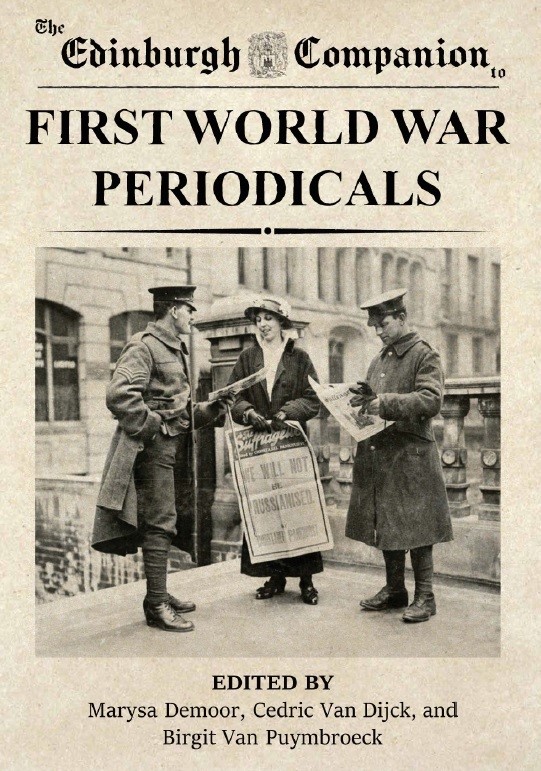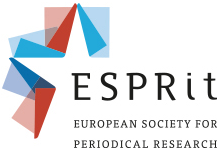Edinburgh Companion to First World War Periodicals Book Launch, 15 May 2023

Edinburgh Companion to First World War Periodicals
Book Launch, 15 May 2023
Hoek 38 (Leuvenseweg 38, 1000 Brussels) or online (MS Teams)
13:00: Walk-in with coffee
13:30: Welcome by Prof. Marysa Demoor (UGent)
13:40: ‘From War Literature to Literate War: What Periodicals Tell Us About the First
World War,’ keynote by Prof. Pierre Purseigle (Warwick University and Francqui
Chair at VUB)
14:50: ‘First World War, Periodicals and the Everyday,’ roundtable with Dr. Dominiek
Dendooven (In Flanders Fields Museum), Prof. Nel de Mûelenaere (VUB), Prof.
Ann-Marie Einhaus (Northumbria University), Prof. Pierre Purseigle (Warwick
University) and Prof. Antoon Vrints (UGent). Moderated by Prof. Birgit Van
Puymbroeck (VUB)
16:30: Reception
All are welcome. Please register before 7 May at This email address is being protected from spambots. You need JavaScript enabled to view it. (indicating
if you will attend in person or online). When following online, please note that all
times are indicated in CEST (GMT+2).
Postgraduate Workshop on Periodical Studies
Call for Papers
ESPRit Postgraduate Workshop on Periodical Studies
11th International ESPRit Conference (Leeds, 27-29 June 2023)
Leeds School of Arts, Leeds Beckett University, UK
Deadline 28 February 2023
Visit the conference website: https://www.leedsbeckett.ac.uk/events/conferences/11-international-esprit-conference/
Postgraduate students working on any topic concerning newspapers, magazines and other periodicals from any historical period, geographical origin, and cultural context are invited to a training workshop linked to the ESPRit 11th conference on 27th June 2023 in Leeds, UK. Registration for participants is free and includes attendance at a professional workshop and the main conference (28-29 June).
To apply, please send the following:
1. A short abstract (approx. 250 words) for a 10-minute presentation. We request that candidates propose a methodological approach or ask a methodology question relating to their research on periodicals.
2. A page-long summary of the thesis, including title, supervisor, affiliation, year of forthcoming or recently completed PhD.
3. A page-long academic CV (including studies, interests, and possible distinctions and publications).
Please send the above as one attachment (word or pdf) to This email address is being protected from spambots. You need JavaScript enabled to view it. with the Subject: ESPRit Postgraduate Workshop, no later than 28 February 2023.
Please note that texts of presentations will be circulated one month in advance of the PGR Workshop.
We look forward to welcoming you to Leeds!
The ESPRit 2023 Selection committee
Laurel Brake, Fabio Guidali, Evanghelia Stead (ESPRit) and Andrew Hobbs (ESPRit 2023)
ESPRit Online seminars 2022-2023
ESPRit online seminars 2022-2023
In order to build our online ESPRit community, we are organising a series of online seminars in collaboration with the ETMIET/KENI team from Panteion University (Athens). Recordings of past seminars are available under Resources. The programme for 2022-2023 is as follows:
8 December 2022, 6pm CET: RSVP/ESPRit Online Seminar on The Foreign Language Press
Diana Cooper-Richet (Université Paris-Saclay): "The Transfopress network (2012-2022): object, activities, publications".
Jennifer Hayward (Wooster college, Ohio) and Michelle Prain (Universidad Adolfo Ibànez, Valparaiso): "The English-Language press in Chile: 19th Century global networks to 21st Century digital dialogues".
Nicolas Pitsos (BULAC/Université Paris-Saclay): "The foreign-language press and the emergence of a polyphonic capital: the case of Paris".
Isabelle Richet (Université Paris Cité): "Helen Zimmern and the Italian Gazette: the editor as cultural go-between".
20 January 2023, 3pm CET: New Computational Approaches to Periodical Studies
Thomas Smits (Antwerp University): 'Distant Viewing the Illustrated World of the Illustrated London News, 1842-1900'
Kaspar Beelen (Alan Turing Institute, UK), 'Mining Victorian Metadata. A computational analysis of historical press directories'
Ben Lee (University of Washington), 'Newspaper Navigator: Reimagining Digitized Newspapers with Machine Learning'
3 February 2023, 3PM CET: Spaces of Translation: European Magazine Culture, 1945-1965
Presentations by members of the research group Spaces of Translation from Johannes Gutenberg-Universität Mainz and Nottingham Trent University: Alison E. Martin (JGU), Marina Popea (NTU), Dana Steglich (JGU), and Andrew Thacker (NTU). More information to follow soon.
3 March 2023, 4pm CET: Knowledge transfer and materiality in and around avant-garde journals
Gábor Dobó (Kassák Museum–Petőfi Literary Museum, Budapest), ‘Comrades and censors: Tracing implied and actual readers of radical periodicals during the interwar period’
Merse Pál Szeredi Dobó (Kassák Museum–Petőfi Literary Museum, Budapest), ‘No clichés. Conflicting aspects of knowledge production and printing techniques of avant-garde periodicals’
2023 ESPRit Conference: Periodicals and Belonging
Call for Papers 11th International ESPRit Conference
Periodicals and Belonging
Time and venue: 27-29 June 2023, Leeds School of Arts, Leeds Beckett University, UK
Visit our website: https://www.leedsbeckett.ac.uk/events/conferences/11-international-esprit-conference/
The 11th International ESPRit conference will be held in Leeds, UK, on the theme of Periodicals and Belonging. This fruitful and timely theme is designed to encourage discussions and collaborations on the ways that ideas, emotions, declarations and imaginings, of belonging or not belonging, manifest in relation to periodical production and reception.
The notion of belonging to a family, a local culture, a national, regional and international group, or a diaspora, including a host of cultural and political ideas, is intrinsic to periodical studies, as is research on communities of authors/contributors, readers, literature and the arts, history, cultural history, linguistics, sociology and memory studies amongst other disciplines. Constitutive to belonging, is the notion of not belonging, and as such, we are interested in exploring themes of exclusion, forms of othering, racialisation, agonism and conflict.
The conference aims to further problematise concepts of association and organisation such as communities (e.g. ‘imagined communities’, ‘interpretive communities’), groups etc., to periodical readerships; enquire into notions of belonging as oppression (periodical policing of boundaries, identities or stereotypes); the use of belonging in marketing/advertising of periodicals, and the role of labour in periodical production (e.g., staff who belong loyally to one publication versus freelance journalists who sell their labour to many titles). Lastly, the conference will consider periodicals as visual and material objects that belong to certain places and spaces (e.g., when used as props or symbols by artists, photographers, film directors and others, or in dentists’ waiting rooms), as well as in circulation and movement across geopolitical locations and chronological periods.
We are particularly interested in exploring:
- Periodical groups and communities (diasporas; artistic; literary; feminist; LGBTQ/H; and, or ethnic groups/cultures; language variants (dialects and sociolects, slang, etc); children; youth; subcultures; identities; academic fields; social, political and professional communities)
- Periodical communities of readers (explored through case studies and/or specifics and/or theoretically), including genres, formats, classifications or hierarchies; in relation to geography and geopolitics (local, regional national, European, ‘Western’, 'other', residents, indigenous, host, exiles, expatriates, colonisers and colonised, migrants and refugees whilst simultaneously interrogate notions of home, homeland, Heimat and terroir, mobility and [im]mobility).
The conference is hosted by the Leeds School of Arts, Leeds Beckett University, in partnership with the University of Central Lancashire in the UK. We aim for linguistic inclusiveness by welcoming multilingual presentations with primary material in the original language accompanied by a translation into English.
We welcome proposals from researchers at all career stages. Proposals of around 250 words (references not included) for 20-minute papers and a short CV (no more than 200 words) should be sent to This email address is being protected from spambots. You need JavaScript enabled to view it.. The deadline for abstracts is 31 January 2023.
We also welcome proposals for joint panels of three papers, and for round tables or other formats. Please include a brief rationale for the panel or round table along with an abstract and CV for each presenter.
Ahead of the main conference, a Postgraduate Workshop will be held. The Call for Papers for this training workshop can be found here.
ESPRit 2023 Organising Committee:
Dr Mary Ikoniadou, Leeds School of Arts This email address is being protected from spambots. You need JavaScript enabled to view it.
Dr Andrew Hobbs, UCLan This email address is being protected from spambots. You need JavaScript enabled to view it.
Dr Annemarie McAllister, UCLan This email address is being protected from spambots. You need JavaScript enabled to view it.
ESPRit 2023 Scientific Committee:
Prof. Fionnuala Dillane, University College Dublin
Prof. Brian Maidment, Liverpool John Moores University
Prof. James Mussell, University of Leeds
Prof. Simon Morris, Leeds Beckett University
Dr. Nora Ramtke, Ruhr University Bochum
